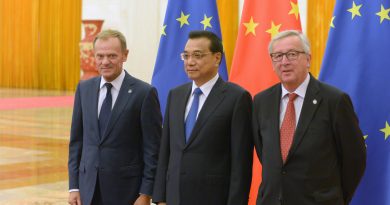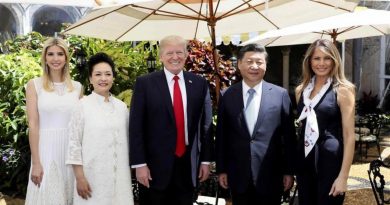Amidst Allies, Iran Makes Nuclear Deal
By Abby Shamray
Editor-in-Chief
The nuclear talks between the United States (and negotiating partners Britain, China, France, Germany, and Russia) and Iran have been heating up the headlines in the past few weeks. A framework for a proposed accord was announced April 2 and since then, both sides have been attempting to forward their objectives and issuing public statements regarding how they hope to approach the issue. The deadline of June 30 is fast approaching and not only is Iran being dodgy about what it’s willing to give but President Obama is facing opposition from a Congress influenced by Israeli skepticism.
The nuclear negotiations have the goal of preventing Iran from being able to build an atomic weapon in the next ten to fifteen years, with the intention of getting rid of what progress toward the weapons Iran currently has. The subjects of the deal would be 19,000 centrifuges at two enrichment sites, the underground Fordow installation, and the larger Natanz center. There is a partially build heavy-water reactor at Arak, uranium mines, and several research centers also being targeted by the terms of the agreement. Iran has come to regard its nuclear program as a national treasure, with over $100 billion being funneled into the program since before the Islamic Republic came into being in 1979.
On April 9, Ayatollah Ali Khamenei gave a televised speech that he also posted on his website. Khamenei stated that sanctions must be lifted before Iran signs an accord are in place and that international inspectors would be banned from any military sites, according to the Los Angeles Times. Regarding the April 2 framework, he stated, “There has been nothing done, and there is nothing binding,” a line that many took as a step back from the progress that had been made. He also expressed the concern that bettered relations with the West could put at risk the Islamic ideology that has been the primary motivator in blocking the US from negotiating with Iran.
Within the US, Khamenei’s speech gave some reason to doubt the validity of the deal. Republican US Senator John McCain questioned on a radio talk show whether or not Secretary of State John Kerry was being honest with the public about how certain the framework to curb Iran’s nuclear program was. “It’s probably in black and white that the ayatollah is probably right,” McCain stated. “John Kerry is delusional.” John Kerry, in response, retorted that if the Russians, usually not allies to the US, released a statement backing up what he stated to be the terms of the agreement, then the interim agreement Kerry described was not incorrect. The division within Congress and the doubt many express about how the deal will pan out made many skeptical about what the final agreement will be—or whether or not it will ultimately happen.
Some US analysts, though, did find substance in the speech to be optimistic, even if only slightly. The content of the speech expanded beyond merely discussing nuclear talks and included wider promises regarding opening up relations with the US with increased cooperation. Within Iran, officials have promised the public that the nuclear talks could lead to economic improvement. Cliff Kupchan, chairman of the Eurasia group, said that he believes that Khamenei is reluctant to push forward with the negotiations because of the risks, but if he is able to show improvements upfront, the public and important political players within Iran would be more welcoming to the possibility.
Analysts have also speculated that one benefit of the negotiations is that there is potential for bettered human rights within Iran. Many prominent Iranian dissidents and human-rights and civil society activists have expressed that increased transparency will only better the human rights abuses currently happening in Iran. The US’s military aggression and economic sanctions have led to increased suffering in the past, but when news of the deal broke, people in Tehran rushed into the streets to celebrate, the Atlantic reported. Akbar Ganji, who has been called Iran’s “preeminent political dissident,” wrote an essay for the Middle East Eye saying that he viewed the talks and deal as a prerequisite for Iranians being able to build a democracy, the base of which they see as security both economically and politically. The reason so many went into the streets in celebration was because they saw it as the possible start of a democratic state.
The Obama administration and its negotiating partners are demanding that relief be delayed until at least six months after Iran starts implementing the deal with sanctions being slowly lifted as well in order to ensure Iran holds up its part of the agreement, as Republic US Senator Bob Corker told CNN on April 19.
Khamenei’s remarks have been interpreted by analysts as not an effort to shut down the US’s efforts but rather as a method to get to a middle ground by making the other side believe the potential of successful talks is in danger.
The main issue with the negotiations is that neither side trust each other. The US is operating under the assumption that Iran will cut any corner it can and cheat at every opportunity. Republic US Senator Marco Rubio said that he believes the agreement leaves too much infrastructure for Iranian nuclear efforts to use. On the CBS program “Face the Nation,” he said that the US should not be afraid of taking military action if certain boundaries are crossed and that a nuclear Iran is too likely a possibility to rule out an intervention.
Iran is fearful that the US will used increased power within Iran to gain insight into its military capabilities as well as Khamenei believing the US to be “given to backstabbing” as well as liars. On April 19, Khamenei told military commanders that the US “created the myth of nuclear weapons so they could say the Islamic Republic is a source of threat,” according to Reuters. Iran also sees the US as an aggressor who will not hesitate to use military intervention. Khamenei criticized US support for a Saudi-led offense in Yemen during his speech regarding the risks of negotiating with the US, not afraid to criticize the US for “supporting the oppressor.” Similarly, though, the US has been wary of Iran having a hand in arming the Houthis, a fact that has added to tensions not only regarding the conflict but also surrounding the nuclear talks.
Neither side feels they can trust each other and both are firm in what they want out of the deal. There is no doubt that there is a great potential for good to be made out of these talks, but the interior tension in the US between those advocating for the deal and those questioning how successful the deal with be, as well as Khamenei’s reluctance to let Iran get the short end of the stick, mean that even with all the potential and all that’s been achieved so far, much work has to be done before June 30.


